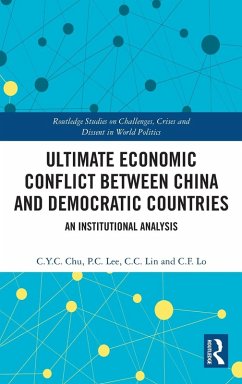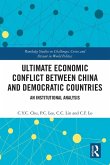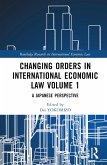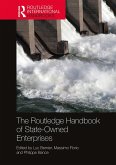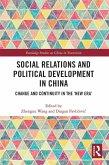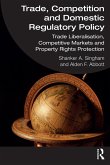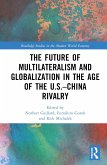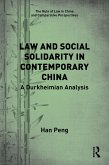This book investigates various dimensions of the economic conflicts between the US - and other democratic market-economy countries - and state-capitalist communist China in the past decade, examining how differences in institutions and ideology bring these about.
Through the lens of institutional analysis, the book elaborates and explains the underlying institutional designs and reasons behind the disputes, highlighting how such variances are embedded and reflect fundamental value divergences between China and other democratic countries.
This book will be of key interest to scholars, students, and practitioners in law, economics, political sciences, international relations, international organisations and global governance.
Through the lens of institutional analysis, the book elaborates and explains the underlying institutional designs and reasons behind the disputes, highlighting how such variances are embedded and reflect fundamental value divergences between China and other democratic countries.
This book will be of key interest to scholars, students, and practitioners in law, economics, political sciences, international relations, international organisations and global governance.
"This book by Cyrus Chu and his colleagues at Academia Sinica is a timely book with deep insight from both an academic and practitioner perspectives on the deep rift between the U.S. and China with a focus on their economic relationship. Contrary to expectation among many policymakers and scholars over the last few decades, gaining entry into the WTO and other multilateral institutions did not bring China to become more aligned with the U.S. and its allies in terms of common values. Instead, China has become more prosperous while attempting to change the liberal economic order to the benefit of the Chinese government. This is an important work of research with a clear framework supported by excellent evidence to understand the rivalry between the two superpowers is founded on different principles which will be hard to bridge."
Syaru Shirley Lin, University of Virginia, Chinese University of Hong Kong and Brookings Institution.
"This eye-opening book transformed the way I think about China's relationships with the advanced market economies, and I strongly recommend it to those seeking to understand the dilemma that so much of the world now faces: the desire to access the large and growing Chinese market, and yet the understandable concern with the serious risks and challenges they will encounter in doing so."
Harry Harding, University of Virginia, USA.
"This is a timely book providing a unique and in-depth analysis of the economic conflicts between market economies and state capitalism in general and between U.S. and China in particular. Each main chapter of the book addresses an important and fundamental difference between the two systems arising from the institutional differences. The discussion is clear and informative with empirical support. It helps readers understand better the current economic conflicts between U.S. and China and points out the difficulties involved in resolving these conflicts under the exiting WTO rules and legal systems. As stated by the authors, the book is not about which system is better, but about understanding the root cause of the conflicts. Only by understanding the real source of the conflicts, we can find ways to overcome them. Thus, I strongly recommend the book to all policy makers in business and economics and to everyone who cares about the relationship between U.S. and China."
Ruey Tsay, H.G.B. Alexander Professor of Econometrics and Statistics, Booth School of Business, University of Chicago, USA.
"In Ultimate Economic Conflict between China and Democratic Countries: An Institutional Analysis, C. Y. C. Chu and co-authors offer careful research and richly elaborated review of the unresolved questions surrounding China's unique system of state capitalism. In recent years many policymakers set aside scholarly efforts to inform decision-making, instead proceeding based on instinct. Policymaking uninformed by research will fail to protect liberal economy interests. With a thorough reexamination of economic literature and great attention to the most salient examples of tensions between China's approaches and market expectations, the authors refresh the debate and bring it up to date. This is extremely timely, as major economies move beyond the ill-informed unilateralism of recent years and commence serious work together to plan an agenda for an era in which convergence with market principles is no longer the base case."
Daniel Rosen, Partner at Rhodium Group, USA.
Syaru Shirley Lin, University of Virginia, Chinese University of Hong Kong and Brookings Institution.
"This eye-opening book transformed the way I think about China's relationships with the advanced market economies, and I strongly recommend it to those seeking to understand the dilemma that so much of the world now faces: the desire to access the large and growing Chinese market, and yet the understandable concern with the serious risks and challenges they will encounter in doing so."
Harry Harding, University of Virginia, USA.
"This is a timely book providing a unique and in-depth analysis of the economic conflicts between market economies and state capitalism in general and between U.S. and China in particular. Each main chapter of the book addresses an important and fundamental difference between the two systems arising from the institutional differences. The discussion is clear and informative with empirical support. It helps readers understand better the current economic conflicts between U.S. and China and points out the difficulties involved in resolving these conflicts under the exiting WTO rules and legal systems. As stated by the authors, the book is not about which system is better, but about understanding the root cause of the conflicts. Only by understanding the real source of the conflicts, we can find ways to overcome them. Thus, I strongly recommend the book to all policy makers in business and economics and to everyone who cares about the relationship between U.S. and China."
Ruey Tsay, H.G.B. Alexander Professor of Econometrics and Statistics, Booth School of Business, University of Chicago, USA.
"In Ultimate Economic Conflict between China and Democratic Countries: An Institutional Analysis, C. Y. C. Chu and co-authors offer careful research and richly elaborated review of the unresolved questions surrounding China's unique system of state capitalism. In recent years many policymakers set aside scholarly efforts to inform decision-making, instead proceeding based on instinct. Policymaking uninformed by research will fail to protect liberal economy interests. With a thorough reexamination of economic literature and great attention to the most salient examples of tensions between China's approaches and market expectations, the authors refresh the debate and bring it up to date. This is extremely timely, as major economies move beyond the ill-informed unilateralism of recent years and commence serious work together to plan an agenda for an era in which convergence with market principles is no longer the base case."
Daniel Rosen, Partner at Rhodium Group, USA.

